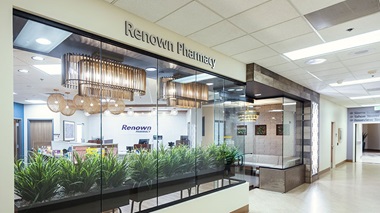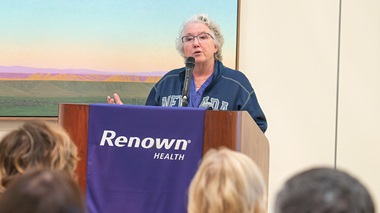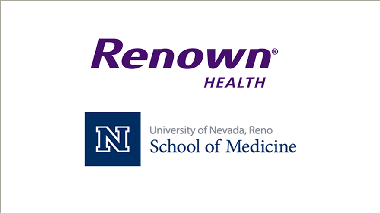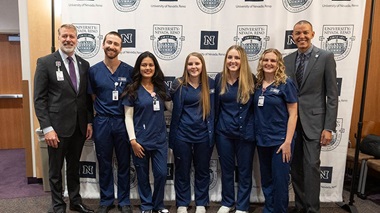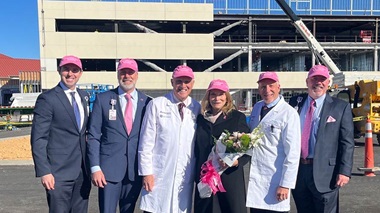Featured News
Careers
Awards & Accreditations
University of Nevada, Reno
Renown Health Foundation
Media Resources

Renown Health's public relations team supports media partners in finding experts on diverse health care topics. In addition, we provide information and answer all questions regarding Renown. We look forward to working with you.
-
Media On Campus
For patient confidentiality purposes, Renown Health policies require media to be escorted by the public relations staff at all times.
PR staff will gladly make parking arrangements, notify the appropriate hospital staff and help you find your destination.
Stand Ups/Live Broadcasts
Media may conduct stand ups and live broadcasts on our campuses. In the interest of patient confidentiality and traffic flow, a staff member will help you find the best location for your story.
We ask you to respect our obligation to protect our patients' well-being and legal right to privacy.
-
Patient Condition Inquiry
We follow regulations of the Health Insurance Portability and Accountability Act of 1996 (HIPAA) for all patients, including patients of public interest. HIPAA regulations specify which information may and may not be released without authorization from a patient.
Patient privacy regulations allow us to only share patient condition information about patients that appear in our directory.
Media inquiries require correct spelling of the patient's first and last name.
Definitions of "Condition" used by Renown Health
When describing a patient's condition, we can only release the following patient statuses:
Good - Vital signs such as pulse, temperature and blood pressure are stable and within normal limits. Patient is conscious, comfortable and there are no complications.
Fair - Vital signs are stable and within normal limits. Patient is conscious and alert although may be uncomfortable or in pain and may have minor complications.
Serious - Vital signs may be unstable or outside normal limits. The patient is acutely ill or injured and may have major complications.
Critical - Vital signs are unstable or outside normal limits. There are major complications.
Note: "Stable" is not a condition.
Press Releases
-
Research Shows Genetic Approaches to Breast Cancer Screenings Yield More Accurate Results
Clinical researchers with the Healthy Nevada Project co-author research paper with findings that emphasize the need for a comprehensive approach to breast cancer risk assessment – including a focus on genetic medicine – to help ensure that individuals at high risk are identified and supported proactively rather than reactively. Breast cancer is a leading cause of cancer death among women in the United States. According to the American Cancer Society, about 1 in 8 women will develop breast cancer and about 1 in 39 women will die from breast cancer. Breast cancer is associated with increased age, hereditary factors, obesity, and alcohol use. Since 1990, breast cancer death rates have declined progressively due to advancements in treatment and detection. In Nevada there are an estimated 2,310 new breast cancer cases a year, and genetic mutations such as in the genes BRCA1 or BRCA2 remain a top risk factor for this prevalent disease. Recognizing the urgency for progress in breast cancer research, a collaborative effort between physicians, advanced practice providers and scientists from the Healthy Nevada Project® (HNP) and Helix have unveiled groundbreaking research. This study explores how genetic screenings are a necessary supplement to traditional testing methods, together offering more accurate insights into a patient's likelihood of developing breast cancer in the future. HNP is operated by Renown Genomic Medicine and the Institute for Health Innovation and is one of the largest community-based population health studies in the country. Their team works in collaboration with Helix, a leader in precision health that delivers comprehensive genomic solutions. Together, this dynamic partnership aims to understand breast cancer risk factors and pave the way for more effective preventative measures. The combined research team studied 25,591 female HNP participants to evaluate the performance of different genetic screening approaches to identify women at high risk of breast cancer. The results of this research suggest that a combined monogenic, or single-gene, and polygenic, or multi-gene, approach to breast cancer screenings helped produce more accurate results and more closely identify study participants who have a high genetic risk of developing the disease. "Based on this research, we are advocating a shift in approach which would improve breast cancer risk assessment through a combination of effective family history ascertainment and genetic screening,” said Joseph Grzymski, PhD, principal investigator of the Healthy Nevada Project, research professor at the University of Nevada, Reno School of Medicine and co-author of the breast cancer research paper. “This tailored approach, founded on the assessment of individual genetic risk, not only intends to elevate patient well-being but also will improve efficiency and equity in healthcare." Complementing the team’s research on leveraging genetics to identify women at low genetic risk of breast cancer that could safely defer mammogram screenings by five to 10 years that was released in late 2023 in JAMA Oncology, the study suggests that incorporating genetic information can assist in personalizing breast cancer screenings and optimizing the use of screening resources. "Existing disparities persist across various facets of breast cancer screening and treatment; however, genetic screening is clearly a powerful tool to help facilitate early intervention for those at higher risk,” said Jamie Schnell Blitstein, APRN, a primary care nurse practitioner at Renown Health and co-author of the breast cancer research paper. “By placing a heightened focus on risk, we underscore the pivotal role of preventative breast cancer screening.” Despite the availability of effective methods for early screening, co-authors of this research found that 78 percent of women with a family history of breast cancer had their risk ascertained only after a breast cancer diagnosis. The findings emphasize the need for a comprehensive approach to breast cancer risk assessment – including a focus on genetic medicine – to help ensure that individuals at high risk are identified and supported proactively rather than reactively. “These findings that can profoundly impact how healthcare is delivered were only made possible by all the participants who were willing to consent to research,” said Alex Bolze, PhD from Helix and co-author of the publication. “Broad-scale collaboration projects like these between Renown Health and UNR that engage large populations where participants share both their genetic information as well as electronic health records drive advancements in preventative medicine, as well as fundamental biological research.” The research paper was officially accepted on Jan. 29, 2024, and will be published by Elsevier, Inc. on behalf of the American College of Medical Genetics and Genomics. The contents of the paper will appear in the international journal Genetics in Medicine Open. Read the full article by visiting sciencedirect.com. The Healthy Nevada Project is currently recruiting new study participants. Free to all Nevadans with a saliva sample or blood draw, participants and their referring providers receive access to whole-exome sequencing and clinical grade results that help provide insight into their unique genetic risks tied to heart disease and certain cancers. If you are interested in enrolling in the study, schedule a Virtual Consent Appointment through MyChart or contact the Renown Institute for Health Innovation at RenownIHI@renown.org or (775) 982-6914 to be connected to a Genomic Representative. About Renown Health Renown Health is the region’s largest, not-for-profit integrated healthcare network serving Nevada, Lake Tahoe and northeast California. With a diverse workforce of more than 7,000 employees, Renown has fostered a longstanding culture of excellence, determination and innovation. The organization comprises a trauma center, two acute care hospitals, a children’s hospital, a rehabilitation hospital, a medical group and urgent care network, and the region’s largest, locally owned not-for-profit insurance company, Hometown Health. Renown is currently enrolling participants in the largest community-based genetic population health study, the Healthy Nevada Project®. To join the Renown Health team, visit renown.org/careers. About Helix Helix is the leading population genomics and viral surveillance company operating at the intersection of clinical care, research, and data analytics. Helix enables health systems, life sciences companies, payers, and government partners to accelerate the integration of genomic data into patient care and public health decision-making. Learn more at helix.com.
-
Helmsley Charitable Trust Grants $3.1 Million to Renown Health
Pictured left to right: Erin VanKirk, MSN, RN, Renown Health Director of Nursing Education; Mitch Krebs, Program Director at Helmsley Charitable Trust; Dr. Graf, Renown Health CEO; Greg Walaitis Renown Health Chief Development Officer. Renown Health will use the grant to build the Helmsley Simulation and Innovation Center to improve the health system’s training abilities The Leona M. and Harry B. Helmsley Charitable Trust has granted $3.1 million to Renown Health for construction of a new simulation and innovation center that will greatly expand the health system’s ability to train healthcare providers throughout northern Nevada. The new center will be named the Helmsley Simulation and Innovation Center. Expected to open in April 2023, the center will feature three simulated patient rooms, classroom space, computer labs and a conference center, allowing trainers to run current and future healthcare professionals through real-life acute, outpatient, telemedicine and specialty care scenarios. The new center will let Renown Health train substantially more nurses, physicians, community clinical partners, medical students and rural providers while improving medical and nursing expertise to support staff throughout northern Nevada. “The Helmsley Charitable Trust is excited to fund this new simulation center, which will provide healthcare professionals across rural Nevada with state-of-the-art training in a variety of situations they’ll encounter,” said Walter Panzirer, a trustee of the Helmsley Charitable Trust. “The project fits with our goal to level the playing field by giving rural residents access to top-notch healthcare, regardless of their ZIP code.” “Simulation education has become standard practice for many of our healthcare personnel,” said Erin Van Kirk MSN, RN, Director of Nursing Education. “This lab will provide expanded opportunities in a controlled setting where physicians, nurses, and students can gain valuable experience in providing the best care possible.” Renown Health has outgrown its current simulation lab, which opened in 2016 in Renown Regional Medical Center. The new, larger, state-of-the-art simulation and innovation center will increase Renown Health’s training capacity from 1,500 to 2,500 each year. The new facility will be equipped with state-of-the-art simulation mannequins and other equipment that includes a telemetry monitor, IV and epidural equipment, a code cart, a defibrillator, a balloon pump, ventilators and a cooling machine. The center will also support Renown Health’s recently established partnership with the University of Nevada, Reno School of Medicine, expanding training modules focused on rural health and virtual care through telemedicine. “The facility will help Renown Health respond to our region’s growing population by allowing us to support the training and competency necessary for our care providers to make a genuine difference in the health and well-being of the people and communities we serve,” said Melodie Osborn, RN, MBA, Chief Nursing Executive at Renown Health. “This generous grant for the new simulation and innovation center from the Helmsley Charitable Trust is truly an investment in the bright future we envision for Renown, our care teams and the community.” About Renown Health Renown Health is the region’s largest, locally governed, not-for-profit integrated healthcare network serving Nevada, Lake Tahoe and northeast California. With a diverse workforce of more than 7,000 employees, Renown has fostered a longstanding culture of excellence, determination and innovation. The organization comprises a trauma center, two acute care hospitals, a children’s hospital, a rehabilitation hospital, a medical group and urgent care network, and the region’s largest, locally owned not-for-profit insurance company, Hometown Health. Renown is currently enrolling participants in the world’s largest community-based genetic population health study, the Healthy Nevada Project®. For more information, visit renown.org. About the Helmsley Charitable Trust The Leona M. and Harry B. Helmsley Charitable Trust aspires to improve lives by supporting exceptional efforts in the U.S. and around the world in health and select place-based initiatives. Since beginning active grantmaking in 2008, Helmsley has committed more than $3 billion for a wide range of charitable purposes. Helmsley’s Rural Healthcare Program funds innovative projects that use information technologies to connect rural patients to emergency medical care, bring the latest medical therapies to patients in remote areas, and provide state-of-the-art training for rural hospitals and EMS personnel. To date, this program has awarded more than $500 million to organizations and initiatives in the states of North Dakota, South Dakota, Nebraska, Wyoming, Minnesota, Iowa, Montana, and Nevada. For more information, visit helmsleytrust.org.
Read More About Helmsley Charitable Trust Grants $3.1 Million to Renown Health

